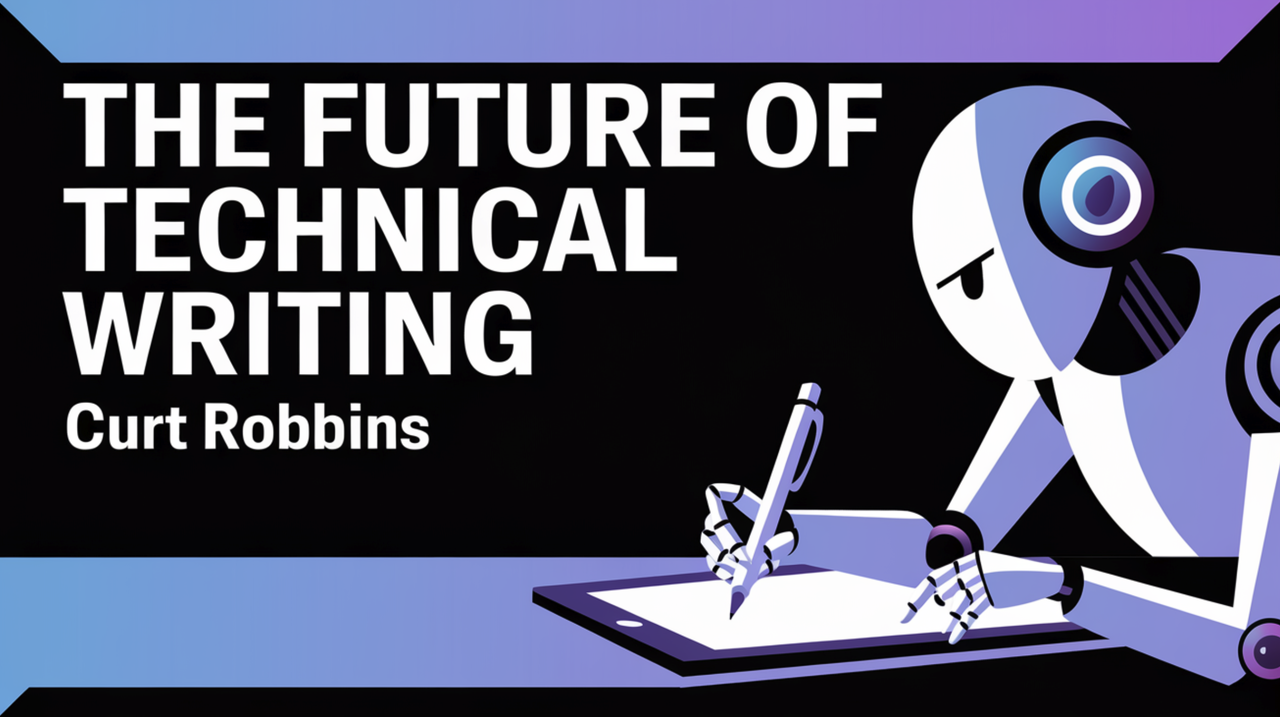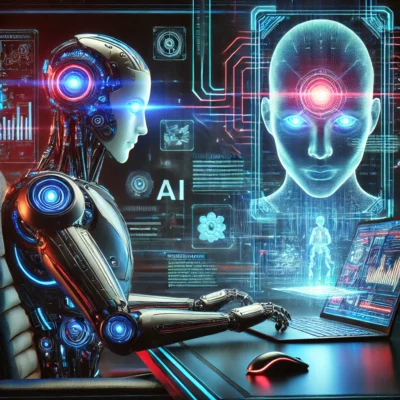Hey there! Ever wondered if those clever AI programs will snatch away your keyboard as a technical writer? It's a question many are asking as AI becomes smarter and more integrated into various industries. This post dives deep into the chatter, separating fact from fiction about AI's role in our field.
We'll explore where AI truly shines, taking over repetitive tasks like drafting and refining basic content. But don't fret - we'll also reveal the unique human skills AI simply can't mimic, such as understanding complex audiences and applying critical thinking. It's not just about what AI can do, but what it can't.
So, is it doom and gloom? Nope! Instead, we'll show how technical writers can team up with AI, mastering new tools like prompt engineering and embracing evolving roles. Get ready to discover how to stay ahead, adapt, and even thrive in this AI-powered world.
Table of contents
Will AI Be the New Kid on the Block for Technical Writers?
In the ever-evolving tech landscape, the buzz around AI potentially replacing technical writers has stirred a pot of mixed emotions. According to a 2025 survey by Cherryleaf, technical communicators are tip-toeing into AI territory, experimenting with this new tool while feeling a tad uneasy about job security. They see AI as a helpful sidekick for tedious tasks but stress the need for human oversight to maintain quality and ensure accuracy.
Albert Xu from Medium shares a lighter take, emphasizing AI's current limitations in matching the depth and personality only a human can bring to writing. For those fretting over AI's takeover, he highlights that while AI can churn out the basics, creating polished, engaging docs still leans heavily on human expertise.
On the flip side, a SAGE journal article outlines a framework where AI and humans can collaborate seamlessly. It posits that AI won't kick technical writers to the curb but will reshape their roles, pushing them towards tasks requiring more creativity and strategy. This sentiment is echoed widely, as many writers view AI as a partner rather than a nemesis, ready to enhance productivity and open doors to new opportunities.
What Technical Writer Tasks AI Can Automate
Generative AI (GenAI) is changing technical communication by automating various writing tasks. While it won't fully replace human technical writers, AI tools handle mundane or repetitive tasks, freeing up writers for more complex challenges. This integration requires a human-in-the-loop approach, ensuring human expertise remains key, as highlighted in the Journal of Technical Writing and Communication.

Credits: Journal of Technical Writing and Communication
Specific aspects of a technical writer's job AI can automate include:
- Drafting: Generating initial content from prompts.
- Revising: Suggesting improvements for existing text.
- Editing: Correcting grammar, style, and clarity issues.
- Scaling: Automating task execution across larger content sets. These tools act as an assistant, supporting brainstorming, drafting, and refining content, as discussed in a framework for using GenAI to automate writing tasks.
What parts of Technical Writer jobs AI cannot replace
AI can assist with certain tasks, but it cannot replicate the nuanced understanding of the audience that human technical writers possess. For instance, an experienced writer can tailor documentation based on user needs, ensuring clarity and engagement that AI tools often miss. As noted in an article from MIT, AI struggles to create content that accurately reflects the complexities of a product. This personalized touch is where human insight plays a key role.
Moreover, technical writers apply critical thinking and problem-solving skills to address unique documentation challenges. They ensure that the information presented is not only accurate but also useful and accessible. An article in the Journal of Technical Writing emphasizes that human oversight is vital for effective technical communication, highlighting that while AI can automate mundane tasks, the expertise of a technical writer remains crucial for producing high-quality content.
How Technical Writers Can Adapt to AI
The role of technical writers is evolving as AI technologies increasingly shape user interactions. Writers are now tasked with creating user-friendly content for AI applications, such as chatbot scripts and API documentation. This shift means that they must focus on simplifying complex technologies and enhancing user experiences. As highlighted by Medium, successful technical writers are those who clarify technology, making it accessible and engaging for users.

Credits: Curt Robbins
To stay relevant, technical writers should embrace new learning opportunities. Familiarity with AI tools, such as GPT-3, is becoming increasingly important. Writers should develop skills like prompt engineering, which involves crafting effective instructions for AI tools to generate desired content. Additionally, understanding cloud computing and cybersecurity can open new career pathways, as noted in LinkedIn Insights. Continuous learning through platforms like Coursera or engaging in open-source projects on GitHub can also enhance their skill set.
Technical Writer Hiring Trends in the US
The job market for Technical Writers in the US is thriving, with LinkedIn reporting over 41,000 available positions as of now. Opportunities span various experience levels, including entry-level and mid-senior roles, indicating a diverse range of job categories from content design to technical documentation. Major cities like New York and San Francisco are hubs for these opportunities, reflecting the industry's growing demand.
According to the Bureau of Labor Statistics, the mean annual wage for Technical Writers is around $86,620, with employment opportunities concentrated in industries such as computer systems design and scientific research. The flexibility of work arrangements is also notable, with many positions offering remote and hybrid options, making it a favorable time for job seekers in this sector.
Is Technical Writer AI safe?
As AI technologies become more prevalent, many technical writers are left wondering if their jobs are at risk. Sneha Pandey argues that while AI will change the landscape of technical writing, it won't replace human writers. Instead, the role will evolve, focusing more on curating and overseeing AI-generated content, which underscores the importance of human judgment and empathy in creating effective documentation.
Research from SkyHive suggests that while generative AI could automate up to 50% of the hours worked by technical writers, critical skills like project management and regulatory compliance remain irreplaceable. Furthermore, AI tools can support writers by handling repetitive tasks, allowing professionals to concentrate on more complex challenges that require deeper insight and creativity.
Overall, the consensus indicates that the technical writer's role is safe from outright replacement by AI. Instead, it is shifting towards becoming more strategic, enhancing collaboration with AI tools while ensuring the quality and relevance of documentation remain high, as noted in discussions around the evolving roles of technical writers.
Hiring a Technical Writer? Here's what to look for
When hiring a technical writer, focus on a blend of traditional writing skills and new proficiencies, especially in AI tools. Look for candidates who can simplify complex information into clear, user-friendly documentation. They should be adept at collaborating with technical teams and possess strong research skills to ensure accuracy in their writing. Tools like Adaface can help you assess these abilities effectively, ensuring that you find a candidate who can thrive in a fast-paced environment.
Key skills to prioritize include clarity in writing, technical proficiency, and adaptability to new technologies. Familiarity with AI writing tools is now a must-have, as these can enhance productivity and content quality. Using Adaface's Prompt Engineering Test and Generative AI Test during the hiring process can help you evaluate candidates' abilities in these areas and streamline your selection.
Prompt Engineering Test
Generative AI Test
Technical Writing Test
The Technical Writer's Next Horizon: AI as Your Co-Pilot
Worried about AI taking over your keyboard? Think of it this way: AI is here to be your co-pilot, not your replacement. It's stepping in to handle the grind-work-like grammar checks, content scoring, and initial drafts-freeing you up to tackle the more creative and nuanced challenges of the job, as highlighted by Acrolinx. This isn't about job displacement; it's about job transformation, making your role richer and more impactful.

Credits: Write Interactive
For those hiring, this means investing in technical writers ready to become AI-assisted knowledge architects, designing intelligent information experiences Archbee Blog. Technical writers will leverage AI to produce high-quality documentation at speed, reducing ideation time by 50% and review cycles by 40% Document360. This partnership boosts productivity and elevates the overall quality of user-facing content.
The future isn't about AI versus humans; it's about humans with AI. By embracing AI as a powerful tool, technical writers can amplify their unique human insights-empathy, critical thinking, and storytelling-to create documentation that truly connects. Let's look forward to a dynamic future where collaboration between human expertise and machine intelligence unlocks unprecedented levels of clarity and innovation in technical communication.

40 min skill tests.
No trick questions.
Accurate shortlisting.
We make it easy for you to find the best candidates in your pipeline with a 40 min skills test.
Try for freeRelated posts



